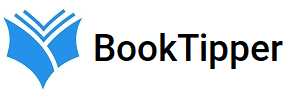Featured Non-Fiction & Biography

END TIMES
by Peter Turchin
“Peter Turchin brings science to history. Some like it and some prefer their history plain. But everyone needs to pay attention to the well-informed, convincing and terrifying analysis in this book.” —Angus Deaton, winner of the Nobel Prize in Economics
“History is hopelessly complex and unpredictable’: so say most historians. If they were right, we would all be in deep trouble, helpless against a myriad of looming disasters. But Peter Turchin has pioneered a new science of making history predictable–by applying methods that had already succeeded in other complex fields. You’ll want to know what he sees lying ahead, and what we can do about it.” —Jared Diamond, Pulitzer-Prize-winning author of Guns Germs and Steel
“Scintillating . . . Turchin’s elegantly written treatment looks beneath partisan jousting to class interests that cycle over generations, but also yields timely policy insights. It’s a stimulating analysis of antagonisms past and present, and the crack-up they may be leading to.” —Publishers Weekly (starred review)
“Peter Turchin provides a powerful synthesis of the historical forces that have brought American society to the dangerous ledge upon which it now teeters. With both clarity and methodological innovation, Turchin shows us on a grand scale why we must address wealth inequality in order to preserve democracy and our nation’s political order.” —Admiral James Stavridis, United States Navy (retired), sixteenth Supreme Allied Commander Europe at NATO, twelfth dean of the Fletcher School of Law and Diplomacy at Tufts University, and author of To Risk It All: Nine Conflicts and the Crucible of Decision
From the pioneering co-founder of cliodynamics, the groundbreaking new interdisciplinary science of history, a big-picture explanation for America’s civil strife and its possible endgames
Peter Turchin, one of the most interesting social scientists of our age, has infused the study of history with approaches and insights from other fields for more than a quarter century. End Times is the culmination of his work to understand what causes political communities to cohere and what causes them to fall apart, as applied to the current turmoil within the United States.
Back in 2010, when Nature magazine asked leading scientists to provide a ten-year forecast, Turchin used his models to predict that America was in a spiral of social disintegration that would lead to a breakdown in the political order circa 2020. The years since have proved his prediction more and more accurate, and End Times reveals why.
The lessons of world history are clear, Turchin argues: When the equilibrium between ruling elites and the majority tips too far in favor of elites, political instability is all but inevitable. As income inequality surges and prosperity flows disproportionately into the hands of the elites, the common people suffer, and society-wide efforts to become an elite grow ever more frenzied. He calls this process the wealth pump; it’s a world of the damned and the saved. And since the number of such positions remains relatively fixed, the overproduction of elites inevitably leads to frustrated elite aspirants, who harness popular resentment to turn against the established order. Turchin’s models show that when this state has been reached, societies become locked in a death spiral it’s very hard to exit.
In America, the wealth pump has been operating full blast for two generations. As cliodynamics shows us, our current cycle of elite overproduction and popular immiseration is far along the path to violent political rupture. That is only one possible end time, and the choice is up to us, but the hour grows late.

100 PLACES TO SEE AFTER YOU DIE
by Ken Jennings
From New York Times bestselling author, legendary Jeopardy! champion, and host Ken Jennings comes a hilarious travel guide to the afterlife, exploring destinations to die for from literature, mythology, and pop culture ranging from Dante’s Inferno to Hadestown to NBC’s The Good Place.
Ever wonder which circles of Dante’s Inferno have the nicest accommodations? Where’s the best place to grab a bite to eat in the ancient Egyptian underworld? How does one dress like a local in the heavenly palace of Hinduism’s Lord Vishnu, or avoid the flesh-eating river serpents in the Klingon afterlife? What hidden treasures can be found off the beaten path in Hades, Valhalla, or NBC’s The Good Place? Find answers to all those questions and more about the world(s) to come in this eternally entertaining book from Ken Jennings.
100 Places to See After You Die is written in the style of iconic bestselling travel guides—but instead of recommending must-see destinations in Mexico, Thailand, or Rome, Jennings outlines journeys through the afterlife, as dreamed up over 5,000 years of human history by our greatest prophets, poets, mystics, artists, and TV showrunners. This comprehensive index of 100 different afterlife destinations was meticulously researched from sources ranging from the Epic of Gilgamesh to modern-day pop songs, video games, and Simpsons episodes. Get ready for whatever post-mortal destiny awaits you, whether it’s an astral plane, a Hieronymus Bosch hellscape, or the baseball diamond from Field of Dreams.
Fascinating, funny, and irreverent, this light-hearted memento mori will help you create your very own bucket list—for after you’ve kicked the bucket.
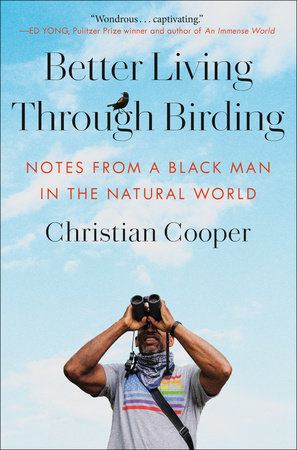

BETTER LIVING THROUGH BIRDING
by Christian Cooper
Central Park birder Christian Cooper takes us beyond the viral video that shocked a nation and into a world of avian adventures, global excursions, and the unexpected lessons you can learn from a life spent looking up.
“Wondrous . . . captivating.”—Ed Yong, Pulitzer Prize–winning author of An Immense World
Christian Cooper is a self-described “Blerd” (Black nerd), an avid comics fan and expert birder who devotes every spring to gazing upon the migratory birds that stop to rest in Central Park, just a subway ride away from where he lives in New York City. While in the park one morning in May 2020, Cooper was engaged in the birdwatching ritual that had been a part of his life since he was ten years old when what might have been a routine encounter with a dog walker exploded age-old racial tensions. Cooper’s viral video of the incident would send shock waves through the nation.
In Better Living Through Birding, Cooper tells the story of his extraordinary life leading up to the now-infamous incident in Central Park and shows how a life spent looking up at the birds prepared him, in the most uncanny of ways, to be a gay, Black man in America today. From sharpened senses that work just as well at a protest as in a park to what a bird like the Common Grackle can teach us about self-acceptance, Better Living Through Birding exults in the pleasures of a life lived in pursuit of the natural world and invites you to discover them yourself.
Equal parts memoir, travelogue, and primer on the art of birding, this is Cooper’s story of learning to claim and defend space for himself and others like him, from his days at Marvel Comics introducing the first gay storylines to vivid and life-changing birding expeditions through Africa, Australia, the Americas, and the Himalayas. Better Living Through Birding recounts Cooper’s journey through the wonderful world of birds and what they can teach us about life, if only we would look and listen.


WHAT AN OWL KNOWS
by Jennifer Ackerman
From the New York Times bestselling author of The Genius of Birds and The Bird Way, a brilliant scientific investigation into owls—the most elusive of birds—and why they exert such a hold on human imagination
For millennia, owls have captivated and intrigued us. Our fascination with these mysterious birds was first documented more than thirty thousand years ago in the Chauvet Cave paintings in southern France. With their forward gaze and quiet flight, owls are often a symbol of wisdom, knowledge, and foresight. But what does an owl really know? And what do we really know about owls? Though our fascination goes back centuries, scientists have only recently begun to understand in deep detail the complex nature of these extraordinary birds. Some two hundred sixty species of owls exist today, and they reside on every continent except Antarctica, but they are far more difficult to find and study than other birds because they are cryptic, camouflaged, and mostly active in the dark of night.
Jennifer Ackerman illuminates the rich biology and natural history of these birds and reveals remarkable new scientific discoveries about their brains and behavior. She joins scientists in the field and explores how researchers are using modern technology and tools to learn how owls communicate, hunt, court, mate, raise their young, and move about from season to season. We now know that the hoots, squawks, and chitters of owls follow sophisticated and complex rules, allowing them to express not just their needs and desires but their individuality and identity. Owls duet. They migrate. They hoard their prey. Some live in underground burrows; some roost in large groups; some dine on black widows and scorpions.
Ackerman brings this research alive with her own personal field observations about owls and dives deep into why these birds beguile us. What an Owl Knows is an awe-inspiring exploration of owls across the globe and through human history, and a spellbinding account of their astonishing hunting skills, communication, and sensory prowess. By providing extraordinary new insights into the science of owls, What an Owl Knows pulls back the curtain on the nature of the world’s most enigmatic group of birds.
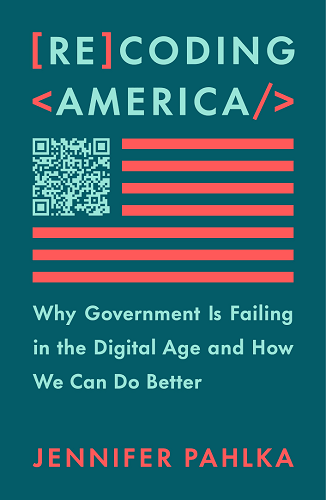

RECODING AMERICA
by Jennifer Pahlka
“The book I wish every policymaker would read.”
―Ezra Klein, The New York Times
A bold call to reexamine how our government operates―and sometimes fails to―from President Obama’s former deputy chief technology officer and the founder of Code for America
Just when we most need our government to work―to decarbonize our infrastructure and economy, to help the vulnerable through a pandemic, to defend ourselves against global threats―it is faltering. Government at all levels has limped into the digital age, offering online services that can feel even more cumbersome than the paperwork that preceded them and widening the gap between the policy outcomes we intend and what we get.
But it’s not more money or more tech we need. Government is hamstrung by a rigid, industrial-era culture, in which elites dictate policy from on high, disconnected from and too often disdainful of the details of implementation. Lofty goals morph unrecognizably as they cascade through a complex hierarchy. But there is an approach taking hold that keeps pace with today’s world and reclaims government for the people it is supposed to serve. Jennifer Pahlka shows why we must stop trying to move the government we have today onto new technology and instead consider what it would mean to truly recode American government.
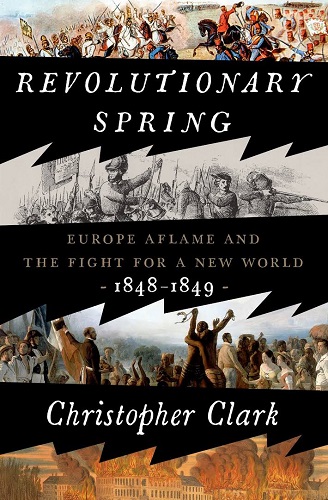

REVOLUTIONARY SPRING
by Christopher Clark
From the bestselling author of The Sleepwalkers comes an epic history of the 1848 revolutions that swept Europe, and the charismatic figures who propelled them forward—“a beautifully written, richly detailed account of a historical moment that rhymes and resonates, in many strange ways, with our own era of turmoil and disruption” (Amitav Ghosh, author of Sea of Poppies).
As history, the uprisings of 1848 have long been overshadowed by the French Revolution of 1789 and the Russian revolutions of the early twentieth century. And yet in 1848 nearly all of Europe was aflame with conflict. Parallel political tumults spread like brush fire across the entire continent, leading to significant changes that continue to shape our world today. These battles for the future were fought with one eye kept squarely on the past: The men and women of 1848 saw the urgent challenges of their world as shaped profoundly by the past, and saw themselves as inheritors of a revolutionary tradition.
Celebrated Cambridge historian Christopher Clark describes 1848 as “the particle collision chamber at the center of the European nineteenth century,” a moment when political movements and ideas—from socialism and democratic radicalism to liberalism, nationalism, corporatism, and conservatism—were tested and transformed. The insurgents asked questions that sound modern to our ears: What happens when demands for political or economic liberty conflict with demands for social rights? How do we reconcile representative and direct forms of democracy? How is capitalism connected to social inequality? The revolutions of 1848 were short-lived, but their impact on public life and political thought throughout Europe and beyond has been profound.
Meticulously researched, elegantly written, and filled with a cast of charismatic figures, including the social theorist Alexis de Tocqueville, the writer George Sand, and the troubled priest Félicité de Lamennais, who struggled to reconcile his faith with politics, Revolutionary Spring offers a new understanding of 1848 that suggests chilling parallels to our present moment. “Looking back at the revolutions from the end of the first quarter of the twenty-first century, it is impossible not to be struck by the resonances,” Clark writes. “If a revolution is coming for us, it may look something like 1848.”


KISS ME IN THE CORAL LOUNGE
by Helen Ellis
Even twenty years into marriage, Helen Ellis’s husband still makes her heart pitter patter. The New York Times bestselling author paints a portrait of true romance for our times in these surprising, sexy, and hilariously frank essays about love, marriage, and her last first kiss.
“Ellis is one of our greatest living humorists, in the same league as Sedaris and Irby…A fascinating portrait of middle-aged love.” —Ann Napolitano, New York Times bestselling author of Dear Edward
Welcome to the Coral Lounge, a room in Helen Ellis’s New York City apartment painted such an exuberant shade that a Peeping Tom left a sticky note asking for the color. It is in the Coral Lounge where all the parties happen: A game called “What’s in the box?” makes its uproarious debut, the Puzzle Posse pounces on a 500-piece jigsaw of a beheaded priest, and guests don blindfolds for a raucous bridal shower.
When the pandemic shuts down the city, the Coral Lounge becomes a place of refuge, where Helen and her husband binge-watch Joan Collins’s Dynasty, dote on two spoiled cats, and where Helen discovers that even twenty years into marriage, her husband still makes her heart pitter patter.


MUD RIDE
by Steve Turner
A down-and-dirty chronicle of the birth and evolution of the Seattle grunge scene—from backyard skateboard ramps and underground hardcore clubs to worldwide phenomenon—as told by one of its founding fathers and lead guitarist of legendary alternative rock band, Mudhoney.
In the late 80s and early 90s, Steve Turner and his friends—Seattle skate punks, hardcore kids, and assorted misfits—started forming bands in each other’s basements and accidentally created a unique sound that spread far beyond their once-sleepy city. Mud Ride offers an inside look at the tight-knit grunge scene, the musical influences and experiments that shaped the grunge sound, and the story of Turner’s bands, Green River and Mudhoney, which went from underground flophouse shows to selling out stadiums with Nirvana and Pearl Jam. Including stories about the key moments, musicians, and albums from grunge’s beginnings to its come-down from the highs of global success and stardom, this is the first account of the musical phenomenon that took over the world from someone who was there for it all.
Written by Steve Turner, lead guitarist of Mudhoney, a foundational grunge band that inspired musical icons from Kurt Cobain to Sonic Youth, Mud Ride features a foreword by Pearl Jam’s Stone Gossard and never-before-seen photographs and grunge memorabilia throughout. Take a seat and ride through the messy and muddy grunge scene that grew from the basements of the Northwest and went on to circle the globe.
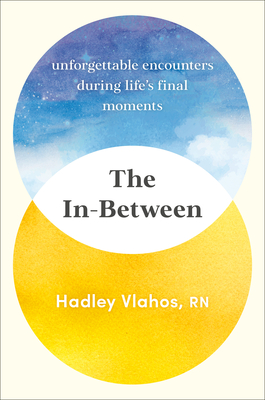

THE IN-BETWEEN
by Hadley Vlahos, RN
Passionate advocate for end-of-life care and TikTok star Hadley Vlahos shares moving stories of joy, wisdom, and redemption from her patients’ final moments in this “brilliant” (Zibby Owens, Good Morning America) memoir.
“This extraordinary book helps dispel fear around death and dying—revealing it to be a natural part of our soul’s evolution.”—Laura Lynne Jackson, New York Times bestselling author of Signs and The Light Between Us
Talking about death and dying is considered taboo in polite company, and even in the medical field. Our ideas about dying are confusing at best: Will our memories flash before our eyes? Regrets consume our thoughts? Does a bright light appear at the end of a tunnel? For most people, it will be a slower process, one eased with preparedness, good humor, and a bit of faith. At the forefront of changing attitudes around palliative care is hospice nurse Hadley Vlahos, who shows that end-of-life care can teach us just as much about how to live as it does about how we die.
Vlahos was raised in a strict religious household, but began questioning her beliefs in high school after the sudden death of a friend. When she got pregnant at nineteen, she was shunned by her community and enrolled herself in nursing school to be able to support herself and her baby. But nursing soon became more than a job: when she focused on palliative care and hospice work, it became a calling.
In The In-Between, Vlahos recounts the most impactful experiences she’s had with the people she’s worked with—from the woman who never once questioned her faith until she was close to death, to the older man seeing visions of his late daughter, to the young patient who laments that she spent too much of her short life worrying about what others thought of her—while also sharing her own fascinating journey.
Written with profound insight, humility, and respect, The In-Between is a heartrending memoir that shows how caring for others can transform a life while also offering wisdom and comfort for those dealing with loss and providing inspiration for how to live now.
Still Hot in Non-Fiction & Biography


THE BOOK OF CHARLIE
by David Von Drehle
One of our nation’s most prominent writers finds the truth about how to live a long and happy life in the centenarian next door.
When a veteran Washington journalist moved to Kansas, he met a new neighbor who was more than a century old. Little did he know that he was beginning a long friendship—and a profound lesson in the meaning of life. Charlie White was no ordinary neighbor. Born before radio, Charlie lived long enough to use a smartphone. When a shocking tragedy interrupted his idyllic boyhood, Charlie mastered survival strategies that reflect thousands of years of human wisdom. Thus armored, Charlie’s sense of adventure carried him on an epic journey across the continent, and later found him swinging across bandstands of the Jazz Age, racing aboard ambulances through Depression-era gangster wars, improvising techniques for early open-heart surgery, and cruising the Amazon as a guest of Peru’s president.
David Von Drehle came to understand that Charlie’s resilience and willingness to grow made this remarkable neighbor a master in the art of thriving through times of dramatic change. As a gift to his children, he set out to tell Charlie’s secrets. The Book of Charlie is a gospel of grit—the inspiring story of one man’s journey through a century of upheaval. The history that unfolds through Charlie’s story reminds you that the United States has always been a divided nation, a questing nation, an inventive nation—a nation of Charlies in the rollercoaster pursuit of a good and meaningful life.


ON OUR BEST BEHAVIOR
by Elise Loehnen
NEW YORK TIMES BESTSELLER • A groundbreaking exploration of the ancient rules women unwittingly follow in order to be considered “good,” revealing how the Seven Deadly Sins still control and distort our lives and illuminating a path toward a more balanced, spiritually complete way to live
Why do women equate self-denial with being good?
We congratulate ourselves when we resist the donut in the office breakroom. We celebrate our restraint when we hold back from sending an email in anger. We feel virtuous when we wake up at dawn to get a jump on the day. We put others’ needs ahead of our own and believe this makes us exemplary. In On Our Best Behavior, journalist Elise Loehnen explains that these impulses—often lauded as unselfish, distinctly feminine instincts—are actually ingrained in us by a culture that reaps the benefits, via an extraordinarily effective collection of mores known as the Seven Deadly Sins.
Since being codified by the Christian church in the fourth century, the Seven Deadly Sins—pride, greed, lust, envy, gluttony, wrath, and sloth—have exerted insidious power. Even today, in our largely secular, patriarchal society, they continue to circumscribe women’s behavior. For example, seeing sloth as sinful leads women to deny themselves rest; a fear of gluttony drives them to ignore their appetites; and an aversion to greed prevents them from negotiating for themselves and contributes to the 55 percent gender wealth gap.
In On Our Best Behavior, Loehnen reveals how we’ve been programmed to obey the rules represented by these sins and how doing so qualifies us as “good.” This probing analysis of contemporary culture and thoroughly researched history explains how women have internalized the patriarchy, and how they unwittingly reinforce it. By sharing her own story and the spiritual wisdom of other traditions, Loehnen shows how we can break free and discover the integrity and wholeness we seek.


RAW DOG
by Jamie Loftus
A NEW YORK TIMES AND INDIE BESTSELLER!
Part travelogue, part culinary history, all capitalist critique―comedian Jamie Loftus’s debut, Raw Dog, will take you on a cross-country road trip in the summer of 2021, and reveal what the creation, culture, and class influence of hot dogs says about America now.
Featured in: NPR Weekend Edition • Bon Appétit • Glamour • USA Today • Boston Globe • Eater • Slate • Buzzfeed and more
“Wise and funny” ―ANDY RICHTER • “Revealing, funny, sad, horny, and insatiably curious” ―SARAH MARSHALL • “A wild ride” ―ROBERT EVANS • “Deeply incisive and hilariously honest” ―JACK O’BRIEN • “Gonzo yet vulnerable” ―GABE DUNN • “Hot dog Moby-Dick” ―BRANSON REESE • “One of the freshest and most insightful new comedic voices of this decade.” ―LINDSAY ELLIS
Hot dogs. Poor people created them. Rich people found a way to charge fifteen dollars for them. They’re high culture, they’re low culture, they’re sports food, they’re kids’ food, they’re hangover food, and they’re deeply American, despite having no basis whatsoever in America’s Indigenous traditions. You can love them, you can hate them, but you can’t avoid the great American hot dog.
Raw Dog: The Naked Truth About Hot Dogs is part investigation into the cultural and culinary significance of hot dogs and part travelog documenting a cross-country road trip researching them as they’re served today. From avocado and spice in the West to ass-shattering chili in the East to an entire salad on a slice of meat in Chicago, Loftus, her pets, and her ex eat their way across the country during the strange summer of 2021. It’s a brief window into the year between waves of a plague that the American government has the resources to temper, but not the interest.
So grab a dog, lay out your picnic blanket, and dig into the delicious and inevitable product of centuries of violence, poverty, and ambition, now rolling around at your local 7-Eleven.
The hardcover edition of Raw Dog: The Naked Truth About Hot Dogs includes gorgeous endpapers, an illustrated case, as well as illustrations by the author throughout.
“Raw Dog will leave you nourished.” ―BuzzFeed
“You will certainly never read a funnier book about taking a hot dog-themed road trip across America.” ―Glamour
As an Amazon Associate, we may earn money from qualifying purchases.
